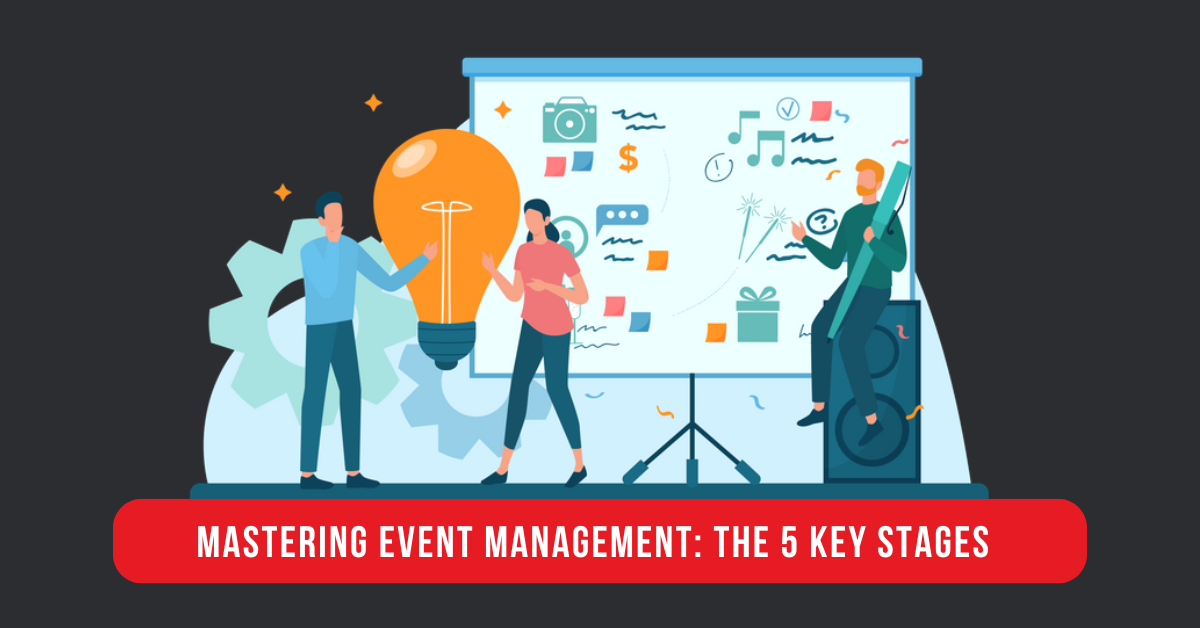One of the disciplines that is multi-faceted in nature is event management, and it can be considered as involving five major stages. If completed successfully, these stages will guarantee a successful outcome for any type of event, whether it be a business conference, wedding, musical festival, or charity fundraising. In this guide, we will go through all the stages of planning events, giving tips, and strategies, and providing a roadmap that you can follow to easily navigate the process of creating great occasions.
Stage 1: Research and Goal Setting
The research phase marks the inception of event planning. The cornerstone of every event is a clear understanding of purpose and target audience. Conducting thorough research to identify the event’s purpose, target audience, budget, timeline, and historical data, will help you in understanding the client’s needs, objectives, and vision which is paramount. You must clarify the objectives and goals you are expecting while laying the foundation for a successful event that meets the client’s expectations.
By staying ahead of the industry standard and with the proper knowledge of consumer preferences, event planners can ensure that their events remain relevant and competitive in the dynamic landscape.
Stage 2: Design the Blueprint
Once you have gained a comprehensive understanding of the client’s expectations, you transit into the design phase. This phase focuses on crafting the master plan. Focusing on conceptualising the event’s aesthetics, decor, and style to create a cohesive and memorable experience resonating with the target audience. For this, you and your client need to work together, brainstorm ideas, select venues, and outline the event content. In this stage, you bring life to the client’s vision and remember attention to detail plays a key role here, From sitting catering arrangements, everything has to be thoughtfully curated to enhance the overall guest experience.
Stage 3: Planning and Logistics
So far you have prepared mould for your event. On paper, everything looks good, now it is time to put the pieces together and collect and make the arrangement that will fill the empty mould. In Stage 3, design is translated into actionable steps. The development phase calls for a consolidated plan of action that will set the timeline, budget, venue preparations, advertising techniques, and ways to engage the stakeholders.
To plan an event, planners use frameworks like Input, Constraints, Output, and Methods (ICOM) to come up with ideas on how different components of the event should look. An example of this coordination is between the event planner and key stakeholders, including vendors, suppliers, sponsors, speakers, as well as production teams, ensuring that all necessary steps have been taken and that things are running smoothly.
Stage 4: Co-ordination and Execution
You have confirmed that everything aligns with your event, now it’s time to put the meticulously plan into action. In Stage 4, pre-event preparations are finalized. The focus shifts to confirming the availability of stakeholders, ensuring enough manpower, and managing supplier requirements. This ensures that everything runs smoothly on the day of the event.
For the success of this phase, the event planners must have open channels to address any concerns that may arise, regular team meetings and clear communication are essential for the coordinated effort. Addressing any last-minute issues is also a crucial part to make sure, that everything is in place for a successful event day. By maintaining a proactive and hands-on approach, planners can address any unforeseen challenges or emergencies swiftly.
Stage 5: Post-event assessment
If you think “all is well, that ends well”, then brace yourself, for in-event dynamics. In the world of event management, success isn’t defined by a mere seamless finale, but the end of an event initialises the 5th stage evaluation phase, or what we call the post-event assessment. In this phase, the planners assess the event’s performance, gather feedback, and identify areas of improvement. Surveys and debriefing sessions with stakeholders or focus groups to gain insights into their experience play a major life in identifying strengths and weaknesses.
With these insights, you can compare the event’s initial objectives established in Stage 1. Such as did the event achieve its goals. The learning from the evaluation assists event planners in refining their approach to future events. Based on an evaluation of KPIs such as attendance rates, audience engagement statistics, revenue derived from the event, and client satisfaction marks, an overview of how effective and rewarding the event was can be obtained. No matter when or where the play ends, our adventure still continues.
Summary
By fostering a culture of continuous improvement, and learning, event planners can not only prepare themselves with refined strategies but also ensure ongoing success in the dynamic field of event management.
These five fundamental phases can assist you in establishing a solid framework for planning and executing successful events. Event managers who wish to achieve best practices that are beyond client expectations and make a deep impression on the participants will have to study thoroughly all the stages of event management. Never forget that only if you are willing to be flexible, can easily adjust to changes in the environment, and make use of technology to simplify workflow, you will definitely achieve successes you would not expect at first.
Also, the great accomplishment of any event depends on harmonious unity between imagination, planning, and action that should be implemented in every phase of event evolution.
In closing, remember event management is not merely about orchestrating gatherings, it is about creating moments that inspire, connect, and transform as your attendees and all the stakeholders invest their time in your event. With passion as your compass and innovation as your guide, you can chart a course toward a future whether every single event is not just a gathering but a journey.

